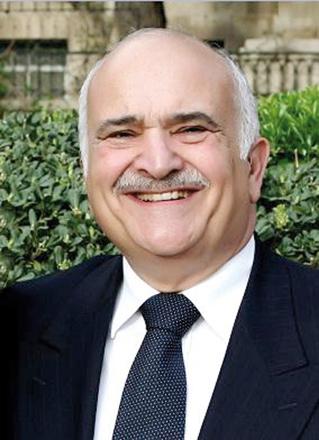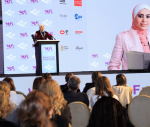You are here
Prince Hassan, Axworthy of WRMC urge int’l action amid Lebanon's escalating humanitarian crisis
By JT - Oct 23,2024 - Last updated at Oct 23,2024

Armoured vehicles of the United Nations Interim Force in Lebanon (UNIFIL) patrol along a road in Marjeyoun in southern Lebanon on Wednesday (AFP photo)
AMMAN — HRH Prince Hassan, honorary president of the World Refugee and Migration Council (WRMC), and WRMC President Lloyd Axworthy addressed on Wednesday the humanitarian crisis in Lebanon, where 740,000 people have been displaced.
Prince Hassan and Axworthy stressed the urgent need for international intervention to provide relief to those affected, urging the international community to take decisive action to address the crisis, enforce international laws, and protect the civilians most vulnerable to the severe impacts of the ongoing conflict, according to a WRMC statement.
“The escalating regional conflict has now expanded into Lebanon, displacing nearly one million people in just the past month,” the statement said, adding, “With large numbers fleeing north and many others crossing borders, the situation is rapidly deteriorating, reflecting the failure to implement long-standing international resolutions addressing the Israeli-Palestinian and Israeli-Lebanese conflicts.”
They also pointed out that despite unanimous support from all five permanent members of the UN Security Council, Resolution 1701 of August 2006 remains unenforced, further destabilising the region, adding that Lebanon, already grappling with an economic crisis since 2019, is facing added strain due to the influx of displaced people.
The rising demand for essential goods and services has driven prices up, placing immense pressure on the country's limited resources, the statement said, stressing that the humanitarian situation in Lebanon has reached critical levels, with an estimated 20 per cent of its 5.7 million population in urgent need of aid.
According to the International Organisation for Migration (IOM), the number of internally displaced persons (IDPs) in Lebanon has surged from 74,000 to 740,000 in the past year alone, the statement said, emphasising that the overwhelming increase has strained Lebanon’s fragile infrastructure, making it difficult for many communities to access basic necessities such as food, healthcare, and shelter.
They also stressed that humanitarian agencies, including the United Nations High Commissioner for Refugees (UNHCR), are working tirelessly to provide relief, noting that the scale of the crisis demands urgent international assistance.
Prince Hassan and Axworthy said, "Similar to the United Nations Relief and Works Agency for Palestine Refugees (UNRWA), the UNHCR’s mission in Lebanon encompasses both humanitarian and development efforts, aiming to provide essential services such as protection, shelter, healthcare, and education to displaced populations."
Prince Hassan and Axworthy also highlighted that the UNHCR mission, in Lebanon, has been vital in coordinating efforts with local and international organisations to manage the refugee influx, ensure basic services, and provide long-term development support to both refugees and the host communities,
They also noted that the ongoing instability in the region poses significant challenges to its operations, as escalating conflicts increase the humanitarian burden and complicate the already difficult living conditions for displaced populations.
The statement also highlighted that the recent attacks on UNIFIL (the United Nations Interim Force in Lebanon) serve as stark reminders that humanitarian and peacekeeping missions are essential pillars of stability and hope in conflict zones, noting that targeting these personnel is not only a grave violation of international law but also a direct assault on the principles of humanity and the commitment to saving lives.
The First Additional Protocol to the Geneva Conventions mandates that civilian medical personnel must be respected and protected, and all available assistance should be provided to them in areas where civilian medical services are disrupted due to combat activity, Prince Hassan and Axworthy said, emphasising that these principles are being violated.
Hersch Lauterpacht once wrote, “If international law is the vanishing point of law, the law of war is the vanishing point of international law,” the statement said, adding "The poignant observation resonates deeply today as we witness the continued degradation of international norms and humanitarian principles in our region."
Prince Hassan and Axworthy also stressed that over the past year, the rapid deterioration and the passively accepted fragmentation have introduced new layers of complexity to the already fraught process of peacemaking.
"Since the end of the Second World War, “limited confrontation” has been the prevailing approach, yet it remains a battle that no one can truly win. This ongoing instability obstructs efforts toward lasting peace and regional harmony," they added.
They also emphasised that the establishment of the Independent Commission on International Humanitarian Issues (ICIHI) in the 1980s aimed to ensure the implementation and compliance with International Humanitarian Law (IHL) in situations of armed conflict.
They noted that IHL, designed to limit the effects of war for humanitarian purposes, seeks to protect those not actively involved in hostilities and restrict the methods and means of warfare, adding "the tragic events unfolding today highlight the alarming extent to which IHL is being disregarded."
Prince Hassan and Axworthy stressed that the international community must act swiftly to address the escalating crisis, enforce international laws, and uphold the protection of those most vulnerable to the devastating consequences of this conflict, noting that immediate action is crucial to prevent further deterioration and to safeguard the lives of civilians caught in the conflict's crossfire.
Related Articles
AMMAN — HRH Prince Hassan, honorary chair of the World Refugee and Migration Council (WRMC), stressed “it is high time that the world moves
AMMAN — The World Refugee and Migration Council (WRMC) has proposed the creation of a humanitarian and reconstruction contact group for Gaza
AMMAN — Jordan and the United Arab Emirates on Tuesday signed a memorandum of understanding (MoU) highlighting and spreading the principles


















